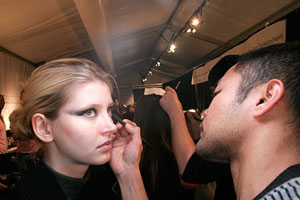Make-up Artist
Tasks & duties

Make-up artists may do some or all of the following:
-
do people's make-up for weddings, balls, job interviews and other special occasions
-
do presenters' or actors' make-up for special effects, film, television and stage productions
-
read scripts and research the period/era of the film or television productions
-
consult with clients, actors, producers or directors about the required look
-
decide on the products to be used
-
write make-up sheets that explain what make-up look shall be applied
-
cleanse, tone and moisturise people's skin
-
apply make-up
-
check actors' make-up
-
make notes and take photos
-
wash and reset wigs
-
sell cosmetic products
-
give make-up lessons
-
establish and work to budgets
Specialisations
Make-up artists may specialise in film and television work, modelling work or special occasions.
Skills & knowledge

Make-up artists need to have:
-
good knowledge of the products they use and how to apply them
-
knowledge of the latest styles and colours
-
artistic ability and an eye for colour
-
understanding of their clients' requirements
-
good communication and people skills
-
research skills to ensure the make-up is appropriate for the period/era required
Business skills and sales skills are important for make-up artists who are self-employed.
Entry requirements
To become a make-up artist in film or television a make-up qualification is preferred.
Training on the job
Many skills are gained on the job. Make-up artists need to keep up to date with trends in the fashion industry and the latest products through reading fashion and make-up magazines, and watching movies and theatre productions.
Useful experience
Useful experience for make-up artists includes:
-
work as a beauty therapist or beautician
-
cosmetic counter work
-
stage productions and theatre work
-
hairdressing work
-
pharmacy work
Related courses
Beauty Therapy
For more information, please refer to Career Services.
Document Actions
